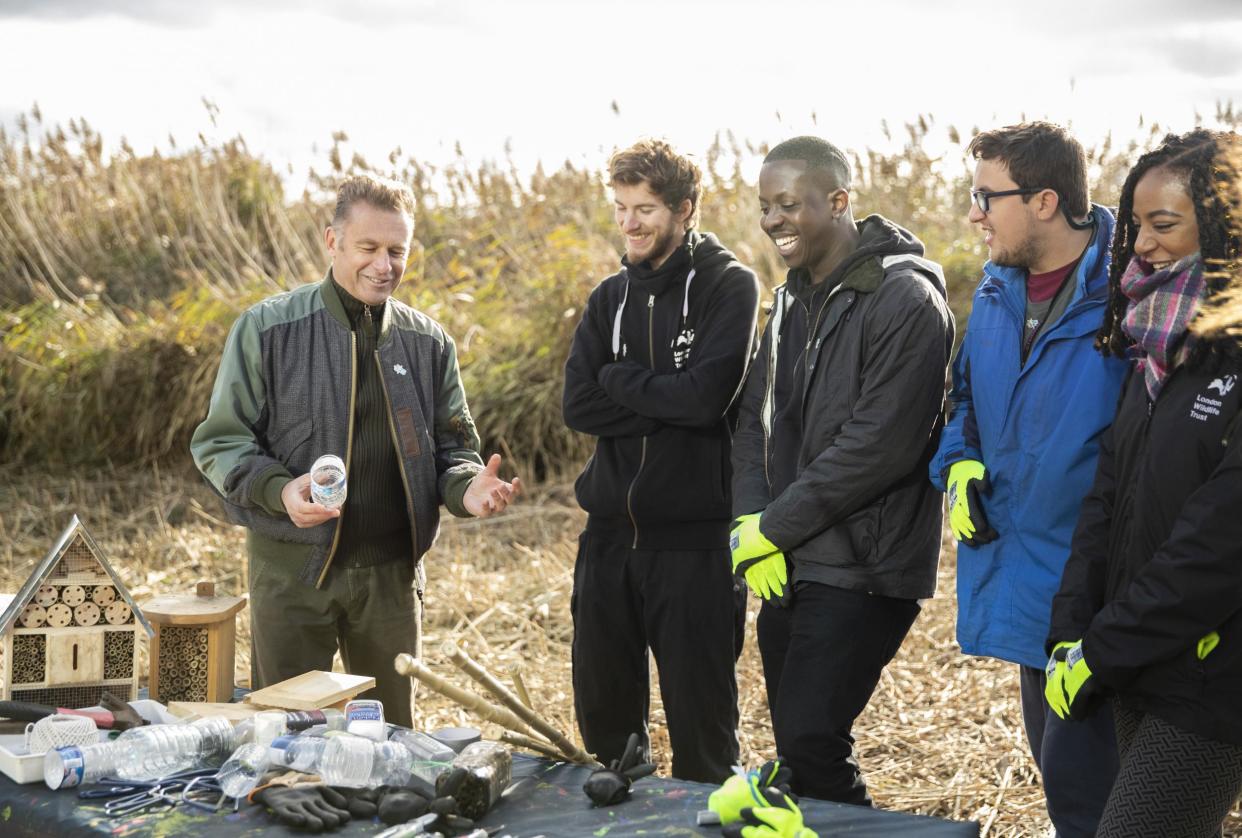SBTV entrepreneur Jamal Edwards tells young Londoners helping the ecosystem is as 'cool' as being in the music industry

Entrepreneur Jamal Edwards has said making garden wildlife sanctuaries is as “cool” as being in the music industry.
The 29-year-old boss of SBTV, who has made millions from his music video empire and helped launched the career of stars including Ed Sheeran, spoke as he joined TV presenter Chris Packham in building a giant “bug hotel” in Manor House.
Edwards grew up in Acton, and spent free time as a child making amateur wildlife films in friends’ gardens.
Handling insects with the Autumnwatch presenter at Woodberry Wetlands reservoir and wildlife oasis, he said: “I used to make loads [of bug hotels] when I was younger, if there were loads of ants around.
“One of the big things is I think lots of people don’t know they can get involved and do little things in their back garden that will help wildlife.
“If there’s an ant’s nest in your garden don’t just trample over it or whatever, make a difference through what you do. It’s important, it’s our ecosystem. People that have been following me for ages know about my wildlife stuff, but a lot found me through music and don’t know, but yeah, they are both cool.”
The National Lottery-funded wetlands project has enabled the area to remain a home for kingfishers, bees and dragonflies in urban north-east London.
At the event the presenter revealed ten top tips created by The Wildlife Trusts, the Woodland Trust, the RSPB that Londoners can follow to help “make a real difference” to wildlife preservation in the capital.
They include putting creating vertical urban gardens on rooftops, putting in a pond if you have a garden - and building a bug hotel.
He told the Standard: “Putting in a pond is the most instantly productive. We don’t want people to think they need the space for a lake though. Even a bucket sunk into the ground will attract an abundance of life.”
Top 10 tips Londoners can follow to help the capital's ecosytem:
Fill your garden with plants: Trees, bushes, climbers, flowers – the more you can fill your space, the better. For maximum effect, choose those that are known to be winners for wildlife, including a sequence of nectar- and pollen-rich flowers that bloom throughout the year for our pollinators.
Create a pond: Even a tiny container pond can attract a whole host of wonderful wildlife. Always think safety first and ensure there are shallow margins or ramps to allow wildlife to get in and out. Include some native pondweed, and some bog plants around the edge, and it should soon burst with life.
Open your garden or balcony as a bird café: Kick off by making your own bird cake or feeders and don’t forget to provide water in a shallow container for drinking and bathing. Clean your bird feeders regularly to help keep your garden birds safe from disease.
Cherish your dead matter: A dead wood or stick pile provides a home for about 20 per cent of Britain’s woodland insects and is food for wood-boring insects. Build these piles somewhere damp and dark to attract insects, toads and newts or find a sunny dry spot and solitary bees may take up residence. Leaf piles and compost heaps also provide valuable cover, and there is a whole host of life that will munch away at it, helping to fuel the garden food chains.
Open up wildlife highways: Cut out little doorways at the base of fences so that hedgehogs, frogs and toads can get from one garden to the next. A 13cm x 13cm hole is ideal. Make sure to ask your neighbours’ permission and get your whole street involved to create an even better mini highway.
Don't hurt the wider world with your gardening: Choose peat-free compost or make your own, limit your carbon footprint and water use, and keep plastic use to a minimum so that your garden benefits the planet as a whole.
Grow your plants in containers to maximise space: For those with a small outdoor space or no garden at all, growing plants in containers and hanging baskets is a great solution for a balcony, porch or windowsill.
Build a bug hotel: Create a multi-storey wildlife hotel that’s full of all sorts of natural materials, providing safe hidey-holes for creatures galore – anything from toads, to solitary bees to bumblebees, and ladybirds to woodlice.
Join a community group in your area: If you live in an urban area, volunteer in a local community project to improve and enhance wildlife in your public spaces.
Plant a tree: Native trees provide food and shelter for local wildlife and a fantastic habitat to support various species. Birds such as greenfinches will love silver birches and feed on the abundant seeds and insects it hosts, and bees will feast on the nectar and pollen provided by alders.

 Yahoo News
Yahoo News 
